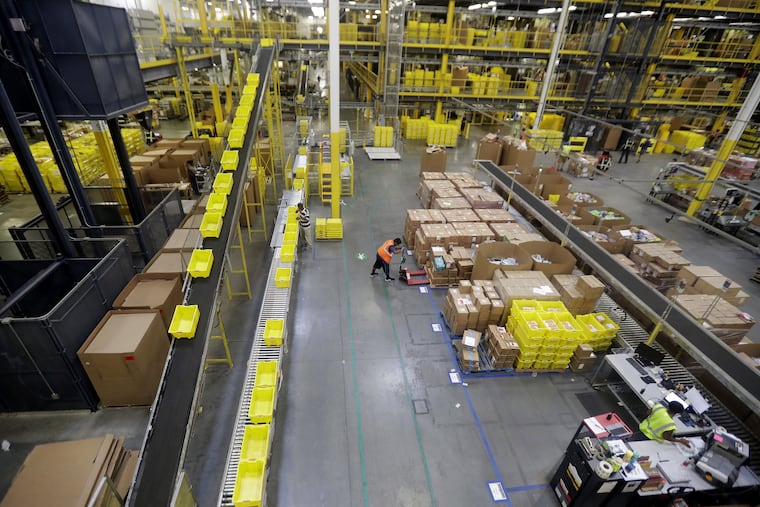Amazon is raising its minimum wage to $15 an hour. Here’s what it could mean for Philly
Days after Mayor Kenney announced he hoped to raise the minimum wage for city workers and contractors to $15, Amazon has done the same.

As Philadelphia continues to court Amazon for its second headquarters, the company, helmed by the richest man in the world, announced Tuesday that it would raise the minimum wage for all its U.S. workers to $15 an hour.
The change, which will go into effect Nov. 1, will affect 250,000 workers with Amazon and Amazon-owned Whole Foods, the company said, including full-time, part-time, and seasonal employees, as well as those hired by temp agencies. The raise does not seem to effect independent contractors such as the Amazon Flex drivers who deliver packages from warehouses to your doorstep.
Deana Gamble, a spokesperson for Mayor Kenney, said he was "pleased to learn that a corporation the size of Amazon understands the benefits that come from their workers earning a living wage."
Just last week, in a move fought for by such organizers as interfaith group Power, Kenney proposed raising the minimum wage for city workers, contractors, and subcontractors to $15, building on the Nutter administration's $12-an-hour minimum wage law.
The Amazon announcement, Gamble said, "sends a powerful message to the private sector that it's not only the right thing to do, it's also good for business."
The move follows a local and national fight for a higher minimum wage. Although the federal minimum hourly wage has remained at $7.25, more than 20 cities and states have raised their own minimum wages, including Seattle, Amazon's hometown. The Service Employees International Union (SEIU) also ran a highly visible "Fight for $15" campaign in 2016 focused on fast-food employees that Philadelphia workers took part in.
In 2014, advocates lobbied the city to raise the minimum wage to $15. The push ultimately failed — Philadelphia is barred from raising its minimum wage due to a state law, according to the city's Law Department.
At Amazon, the average full-time warehouse employee was making more than $15 an hour, including stock and incentive bonuses, but the company has not disclosed the rates for part-time, seasonal, or temp agency workers. At an August 2017 Amazon job fair in Robbinsville, N.J. where thousands lined up for jobs, prospective warehouse employees said the company was offering $13.50 to $14.50 an hour.
Entry-level Whole Foods employees in Philadelphia and New Jersey stand to get a raise: A Whole Foods employee who works in Princeton said the starting rate for workers in the Mid-Atlantic region was $12 an hour. He added that, historically, when starting rates were raised, workers with higher wages eventually got increases, too.
The power of public anger
Some see Amazon's new policy as a response to the public anger that has continued to mount in response to the working conditions for low-wage Amazon workers, especially given the contrast with the company's success. This year alone, news surfaced of a delivery driver who got injured on the job and was then pressured to finish working; an independent contractor working for Amazon's Flex delivery program who paid tens of thousands of dollars in expenses out of his own pocket to do his job, one in which he doesn't get any benefits or overtime; and warehouse workers who got injured and found it impossible to get workers' compensation.
Some Whole Foods workers, too, recently launched a bid to unionize, a campaign the company has vigorously fought. The workers called for a $15 minimum wage.
Meanwhile, Jeff Bezos, the CEO of Amazon, has become the richest man in the world. Amazon's market capitalization passed $1 trillion last month, though it's fallen a little since. (Amazon's stock price ended Tuesday down 1.65 percent at $1,971.31.) Politicians and commentators on either extreme of the political spectrum have united in their ire for the company.
Activists and organizers in Philadelphia have also called out the city for pandering to Amazon in an effort to win the company's HQ2 competition. They say Amazon does not have a good track record of treating its workers well, and have asked why Philadelphia is willing to give the company a massive — and undisclosed — package of tax incentives to relocate here.
The new minimum wage could satisfy advocates concerned about equitable economic development.
In their fight for a "Fair Workweek" scheduling law for fast-food and retail workers, Councilwoman Helen Gym and organizers with OnePA have spoken about the importance of making the jobs that exist in Philadelphia "good jobs." They want to find a way to make hospitality and retail jobs, which make up nearly one-fifth of the city's jobs, pay a living wage and offer enough hours and benefits for poor Philadelphians to rise out of poverty.
Raising standards
Due to low unemployment and increased demand for workers, finding and retaining employees is a major challenge for warehouses across the country, especially during seasonal spikes. Companies that operate warehouses have been forced to find ways to attract workers, said Jeremy Davidson, a Nashville-based director with supply chain services company Fortna. One of those solutions is raising wages. (Another is developing Uber-like, flexible work schedules.)
If Amazon sets a standard of $15 minimum wage, other warehouses may have to follow suit in order to compete. That bodes well for Philadelphia, which Davidson says is sure to see an increase in warehouse jobs in the next few years.
Amazon is already one of the biggest employers in New Jersey. Just last month, it was hiring for 2,600 warehouse jobs in the state, including 1,500 full-time jobs at a soon-to-open 1.7 million-square-foot fulfillment center in West Deptford. It also has centers in the warehouse belt of Central Pennsylvania, in the towns of Breinigsville, Carlisle, and Hazleton, as well as a new clothing plant in Norristown.